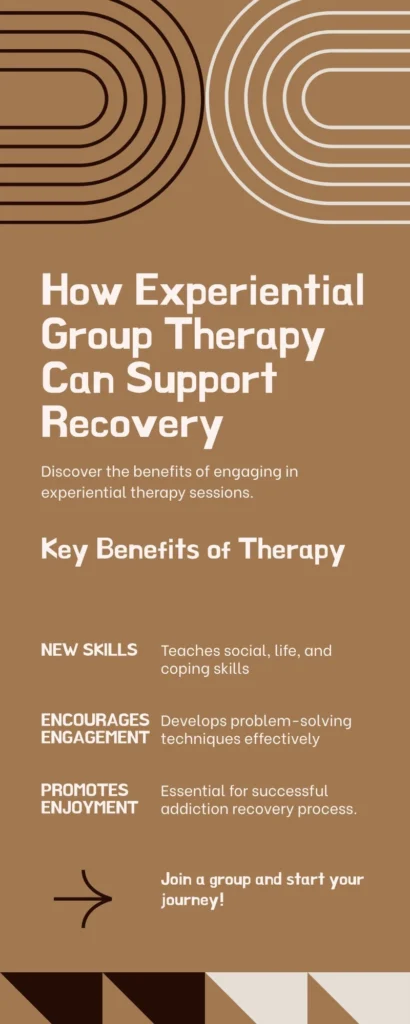Roaring Brook Recovery integrates experiential group therapy into its comprehensive addiction treatment programs to enhance the recovery process. Experiential group therapy involves engaging clients in activities—such as art therapy and hiking—that promote enjoyment, teach valuable coping and life skills, encourage emotional expression, and support social interaction. These therapies are provided alongside evidence-based treatments like cognitive behavioral therapy, 12-step support, and individual therapy. The center offers various levels of care, including a Partial Hospitalization Program (PHP), Intensive Outpatient Program (IOP), sober living options, and an alumni program for continued support after treatment. Additional services include medication-assisted treatment (MAT) and a hepatitis C treatment program. Located in Kentucky, Roaring Brook Recovery emphasizes holistic, person-centered care for lasting recovery.
How Experiential Group Therapy Can Support Recovery
Experiential group therapy uses experiences (activities) to support the recovery process. At Roaring Brook Recovery, experiential group therapy is one of the treatment methods we use to help clients overcome addiction. So, what should you know? Let’s explore how experiential group therapy can support recovery, including how we incorporate it into our programs.
When it comes to how experiential group therapy can support recovery, there are multiple potential benefits that we see in our clients. For example, experiential therapies may teach new skills. This can include social, life, and coping skills. Group therapy requires engagement with other clients and can encourage the development of problem-solving techniques. Additionally, experiential therapies promote enjoyment. Finding ways to have a good time is essential in addiction recovery. The activities used in experiential therapies—for example, creative activities—can serve as outlets for clients to release stress and negative emotions or thoughts.
Experiential Therapy Program in Kentucky
Our experiential therapy program in Kentucky incorporates experiential therapies alongside other evidence-based treatments. This is part of our comprehensive approach to addiction recovery. Examples of experiential therapy you might participate in at our center include, but are not limited to, creative therapies such as art therapy and outdoor activities like hiking. These are held in group settings. This complements other treatments that are centered, such as individual therapy sessions, which let you talk with an assigned therapist one-on-one.
Levels of Care and Services
Here are the levels of care and services Roaring Brook Recovery offers to individuals overcoming drug and alcohol abuse. All of the programs and resources available at our center allow us to provide tailored, high-quality care that addresses all aspects of your well-being and recovery process.
Partial Hospitalization Program
Our partial hospitalization program (PHP) in Kentucky meets five days per week. On treatment days, you can expect to be at our center for about four hours per day. PHP is more immersive than a traditional outpatient program. This is the level of care at our center where you will get the most therapy and support, including experiential therapy groups, 12-step, and behavioral therapies, like cognitive behavioral therapy. A common starting level of care at our center, PHP can act as a step down from or an alternative to inpatient rehab.
IOP in Lexington, KY
Our intensive program (IOP) in Lexington, KY, is the next step down from PHP in intensity. Although the same effective and comprehensive approach to treatment is used, this level of care has a lower time commitment than PHP. IOP clients attend treatment four days per week for about three hours on each treatment day. You can start treatment with IOP, or you can step down to IOP after completing PHP.
Sober Living Kentucky
We provide sober living in Kentucky alongside PHP and IOP addiction treatment programs. While you do not need to stay in sober housing to participate in treatment with us, many of our clients choose to do so because of the benefits it provides. For example, an added sense of community connection, accountability, and lifestyle structure.
Alumni Program
The alumni program at Roaring Brook Recovery provides ongoing support for former clients. Alumni programs support those who have finished treatment by offering check-in calls, meetups, and other resources, like job and education assistance.
Hepatitis C Treatment Program
Some people recovering from drug and alcohol abuse may live with hepatitis C, which is highly treatable but can be a difficult diagnosis to receive emotionally. Our hepatitis C treatment program provides medical care, counseling, and specialized support groups for affected clients.
Medication-Assisted Treatment
Though medication-assisted treatment (MAT) is not the right fit for everyone, it can benefit some people in addiction recovery alongside therapy services. We offer MAT conservatively and as needed for clients who find that it supports their recovery.
Call Roaring Brook Recovery to Learn More About Experiential Group Therapy for Addiction
Roaring Brook Recovery offers person-centered, evidence-based addiction recovery services grounded in the principles of the 12-step program. Alongside other treatments, experiential therapy is used at our facility to support the best outcomes in our clients. Call Roaring Brook Recovery to learn more about experiential group therapy for addiction, or to get more information about our programs, today at (859) 780-7410.
Frequently Asked Questions (FAQs) About How Experiential Group Therapy Can Support Recovery
How does experiential group therapy support other treatments used at Roaring Brook Recovery?
All types of therapy proven effective for addiction are a little bit different. This means that each type of therapy can come with different benefits. How each type of therapy is conducted will look quite different, too. Some therapy sessions at our center will focus on heavier subject matters; others concentrate on guiding clients through the use of specific coping skills, like mindfulness. Some promote mind-body wellness; others focus on things like communication and interpersonal relationships. In short, all of the therapies used at our center, which include experiential therapies, support one another because they can expose you to different skills and ideas.
What are some examples of experiential group therapies?
Examples of experiential group therapies can include but are not limited to art therapy, music therapy, outdoor therapies and activities (such as hiking), equine therapy, and psychodrama (a type of therapy that involves role-playing). Even though the different types of experiential therapy utilize very different activities, they all involve hands-on experiences.
How does experiential group therapy differ from other therapy groups?
There are many different types of groups and group therapy sessions that can be used in the addiction treatment space. For example, we use 12-step meetings, which operate in a group setting, and things like process groups, where clients talk about shared experiences and emotions. However, rather than focus primarily on discussion topics (e.g., grief, how to build coping skills, relapse prevention), experiential psychotherapy will always use an experience or hands-on activity of some kind to engage clients directly.
How many people are usually in group therapy sessions?
It depends. Group therapy sessions, which are not the same as peer-led support groups, often involve around 5-15 individuals. Factors that influence how many people are in group therapy sessions include things like where you attend group therapy.



